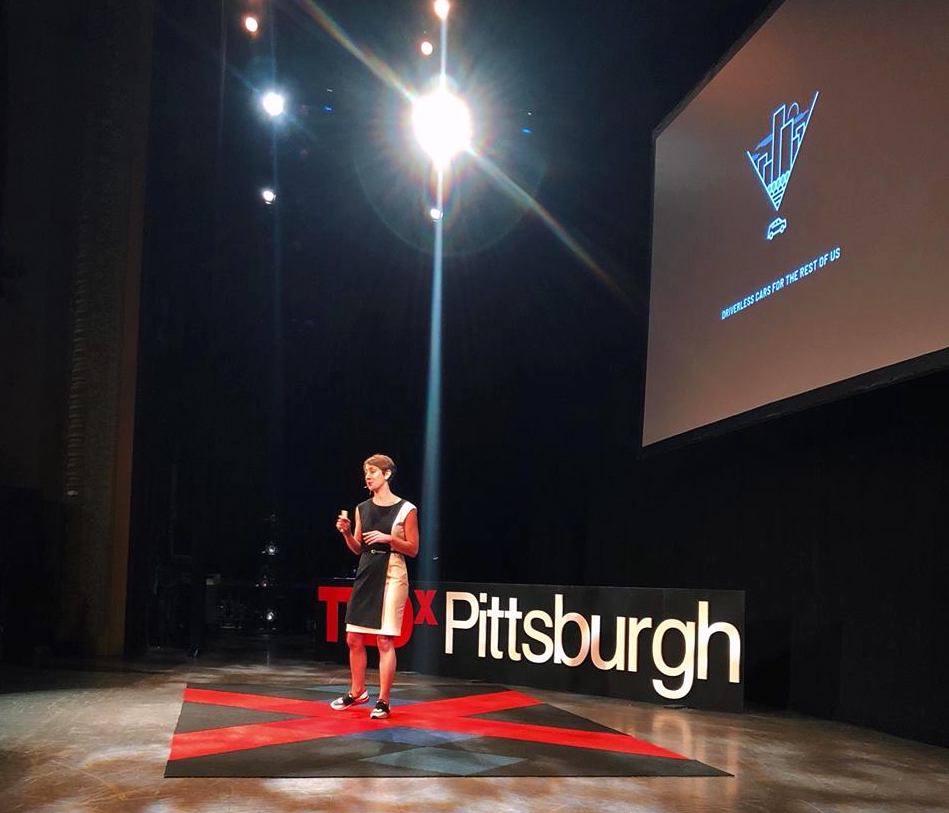The T in TED was well-represented at TEDxPittsburgh, with presenters sharing ideas on the impact of cyberbullying, the humanity needed in autonomous vehicle development and using AI to help prevent opioid relapses.
Under the theme “Small Worlds, Bold Ideas,” TEDxPittsburgh’s third annual conference convened a diverse lineup of speakers including Mayor Carmen Yulin Cruz of San Juan, Puerto Rico; Leadership Pittsburgh CEO Aradhna Oliphant; and community activist Leon Ford, who was left paralyzed in a 2012 police shooting.
The technology discussions centered on big-picture issues that are having an impact in Pittsburgh. Here’s the rundown:
Preventing opioid relapses with artificial intelligence
Citing a shockingly high relapse rate among heroin users who receive the traditional 30-day treatment program, Ellie Gordon, the founder of local startup Behaivior (with an extra I for AI), said she and her team looked at the problem of opioid addiction from a design perspective.
They wanted to create a program that would include wearables and smartphones in the recovery process, Gordon said, customizing “interventions” that determine when a person with addiction is most at risk for a relapse.
Behaivior's wearable tech would help nudge people toward positive behaviors.
The program would measure physiological symptoms like heart rate and could use geolocation to determine if a user isn’t attending support group meetings. A pre-arranged message to the user or an alert to a designated family member or care provider would go into effect. In extreme cases, the technology could detect when an overdose is imminent or happening, and give quicker access to Narcan or other emergency treatments.
“The beauty of our technology Intervention can be completely customized in advance, to do whatever people know will help them most in their time of need,” Gordon said. The wearable tech, which is still in the design stage, would help “nudge” people toward positive behaviors.
“It’s a guardian angel on your wrist,” she said.
Keeping humanity in driverless vehicles
Mobility expert Courtney Ehrlichman calls autonomous vehicles “a beautiful orchestration of code, lasers and machine learning.” Pittsburgh is at the forefront of a new mobility revolution, Ehrlichman said, but now is the time to make sure humanity drives the conversation as cities prepare for autonomous vehicles.
Back in 2013, Ehrlichman said, in her role as deputy executive director for the transportation research center at Carnegie Mellon University, she helped execute a 33-mile driverless car ride from a Pittsburgh suburb to Pittsburgh International Airport for top local and federal officials.
“It went off without a hitch,” she said. But she’s lost close friends to traffic fatalities, and wants to see safety be a top priority for autonomous vehicles.

“We need to make sure they work for all of us, and I’m not sure we know what that means yet,” she said. While “code is the new concrete, lasers are the new eyes on the road and data is the new fuel,” cities need to be thinking now about how they’ll offset revenue from parking tickets, what they’ll do with parking lots that are no longer needed, and who has access to data that car companies collect.
“We’re letting car companies develop their products on our roads, in public right-of-ways using our data and us as crash test dummies,” she said.
Instead of waiting to be granted access to private companies’ data, cities should be creating community data trusts and licensing that information back to industry, Ehrlichman said. Unneeded parking lots could be repurposed for affordable housing, and cities could charge a per-mile fee to autonomous vehicle companies to offset lost revenue from parking tickets.
“We the people need to ensure that as this revolution unfolds, humanity does not take a back seat,” she said.
Removing the shame from online harassment
Former television anchor Darieth Chisolm told the harrowing story of how a vengeful ex posted nude photos of her — taken while she was sleeping — online, and how difficult it was to have the photos removed and the offending ex brought to justice.
We need to restore dignity to victims.
“I couldn’t believe this was happening to me, I didn’t even know what to call it,” she said. “You might know it as cyberbullying or cyber harassment; the media calls it revenge porn. I call it digital domestic violence,” she said.
She pointed out the lack of legislation and laws to criminalize revenge porn at the federal level.
Chisolm started a project called 50 Shades of Silence that seeks to raise awareness about online harassment, and is working on a documentary. Her goal is to help other victims of online bullying and revenge porn know they are not alone.
“We need to restore dignity to victims,” Chisolm said.
Watch the full playback of TEDxPittsburgh here.
Get Pittsburgh civic tech stories in your inbox weekly






